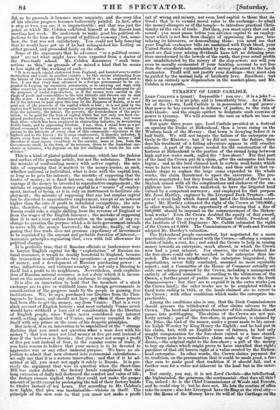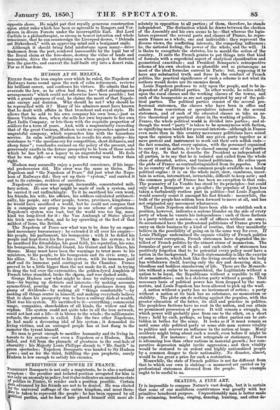TYRANNY OF LORD CARLISLE.
Loan CAurrsts a tyrant! Impossible ! you cry; it is a joke ?— By no means; it is no joke, and is lamentably true. As a Minis- ter of the Crown, Lord Carlisle is in possession of regal power ; that power he has exercised in defiance of justice, to the ruin of individuals; and the simple epithet to designate such exercise of power isty. ranny. We will recount the case on which we base so serious a charge. three Not quite years ago, Lord Carlisle presided at a festival on opening the Docks at Birkenhead, then a town rising on the Western bank of the Mersey : that town is decaying before it is half built. We will not impute the failure of the enterprise en- tirely to the Minister; but if he did not cause the failure, then does his treat:inept of a failing adventure appear in still crueller colours. A part Of the space needed for the construction of the harbour at Birkenhead is the _portion of the strand lying between high and low water mark, 'called the "fore-shore." For that part of the land the Crown put in-a claim, after the enterprise had been begun ; and as the land claimed took in certain mud-banks which were to have been converted into docks, and then sold in that -va- luable shape to replace the large sums expended in the whole works, the claim threatened to upset the enterprise. The pro- moters negotiated; but they found m the Minister of the Crown a Shylock armed with all the complications and darkness of the am- phibious law. The Crown undertook to have the litigated land valued by a competent surveyor ; and employed for that purpose Mr. Jesse Hartley, engineer to the Liverpool Dock Trustees—offi- cer of a rival body which feared and hated the Birkenhead enter. prise ! Mr. Hartley estimated the right of the Crown at 798,0001.; an other words, he took the opportunity of advising that a fine of 800,000/. should be imposed on the commencement of the Birken- head works! Even the Crown doubted the equity of that award, and submitted the survey to Mr. William Cubitt, President of the Institute of Civil Engineers : Mr. Cubitt estimated the right of the Crown at 8,5001. The Commissioners of Woods and Forest; adopted Mr. Hartley's valuation. The Birkenhead people succumbed, but negotiated for a more practicable form of settlement with the Crown,—offering a commu- tation of lands, a rent, &c. ; and asked the Crown to help in raising money towards an enterprise, much altered, in which the Crown now had a joint interest. For observe, the value claimed for the fore-shore could only be ascribed to the enterprise thus im- peded. The aid was insufficient; the enterprise languished; the negotiations, never fully concluded, assumed no more equitable aspect; and a Committee of the House of Commons actually set aside one scheme proposed by the Crown, including a management entirely of official nominees. According to the ultimatum of the Crown, a further grant of public money is to be made to the Dock Commissioners : but they are to expend it in the outer works [on the Crown land] ; the outer works are to be completed within a fixed term ending in 1854, or the lands claimed are to revert to the Crown ; with other conditions which make the enterprise nu- practicable. Among the conditions also is one, that the Dock Commissioners should procure the -withdrawal of other claims adverse to the Crown. The hard and iniquitous character of this condition almost passes into pettifogging. The claims of the Crown are not per- fectly certain ; part of the fore-shore, in particular, is claimed. by Mr. Price, the lord of the manor, -under a grant made to his ances- tor Ralph Worsley by Xing Henry the Eighth; and he had put in his claim, but, -with. an "English sense of fairness, he had only sought compensation for the fore-shore valued as a bare strand. The Crown puts in a cumulative claim made up of these ingre- dients,—the original right to the fore-shore ; a gift of the money to buy up claims which might prove to have annulled that right; purchase of that old barren right at a value created by the Birken- head enterprise. In other words, the Crown claims payment for its tradition, on the presumption that it could be made good, a fur- flier sum to make good that tradition if it should fail, and a further sum for a value not inherent in the land but in the enter. prise. But surely, you say, it is not lord Carlisle—the intellectual, the highmindecl, the generous, the sentimental—that does all this? Yes, indeed : he is the Chief Commissioner of Woods and Forests, and he could stop it; but he does not. He lets the routine of office take its course ; also lets Liverpool have its fling at the rival city— lets the Rome of the Mersey have its will of the Carthage on the
_ opposite shore. He might put that royally generous construction upon strict rules which has been so agreeable to Rangers and Ver- derers in divers Forests under the incorruptible Earl. But Lord Carlisle is a philanthropist, so strong in honest intention and whole conscience, that he can countersign the Liverpool decree, " Delenda cat Birkenhead," with an approving mind and a benignant smile. Although it should bring fatal misfortune upon many—drive tradesmen from the port, rendered inaccessible by the legal bar of the Royal claim at the fore-shore, destroy the value of lands and tenements, drive the enterprising men whose project he flattered into the gazette, and convert the half-built city into a desert ruin. For so it has done.



























 Previous page
Previous page